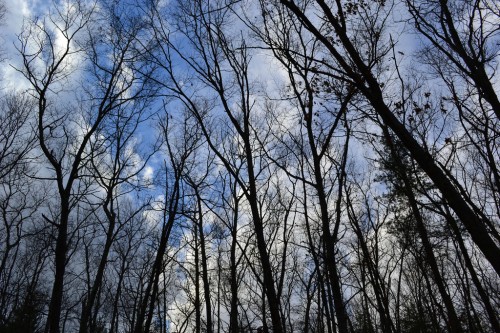 I have met with but one or two persons in the course of my life who understood the art of Walking, that is, of taking walks, who had a genius, so to speak, for sauntering; which word is beautifully derived “from idle people who roved about the country, in the middle ages, and asked charity, under pretence of going à la sainte terre” — to the holy land, till the children exclaimed, “There goes a sainte-terrer“, a saunterer — a holy-lander. They who never go to the holy land in their walks, as they pretend, are indeed mere idlers and vagabonds, but they who do go there are saunterers in the good sense, such as I mean. Some, however, would derive the word from sans terre, without land or a home, which, therefore, in the good sense, will mean, having no particular home, but equally at home everywhere. For this is the secret of successful sauntering. He who sits still in a house all the time may be the greatest vagrant of all, but the Saunterer, in the good sense, is no more vagrant than the meandering river, which is all the while sedulously seeking the shortest course to the sea. But I prefer the first, which indeed is the most probable derivation. For every walk is a sort of crusade, preached by some Peter the Hermit (1) in us, to go forth and reconquer this holy land from the hands of the Infidels.
I have met with but one or two persons in the course of my life who understood the art of Walking, that is, of taking walks, who had a genius, so to speak, for sauntering; which word is beautifully derived “from idle people who roved about the country, in the middle ages, and asked charity, under pretence of going à la sainte terre” — to the holy land, till the children exclaimed, “There goes a sainte-terrer“, a saunterer — a holy-lander. They who never go to the holy land in their walks, as they pretend, are indeed mere idlers and vagabonds, but they who do go there are saunterers in the good sense, such as I mean. Some, however, would derive the word from sans terre, without land or a home, which, therefore, in the good sense, will mean, having no particular home, but equally at home everywhere. For this is the secret of successful sauntering. He who sits still in a house all the time may be the greatest vagrant of all, but the Saunterer, in the good sense, is no more vagrant than the meandering river, which is all the while sedulously seeking the shortest course to the sea. But I prefer the first, which indeed is the most probable derivation. For every walk is a sort of crusade, preached by some Peter the Hermit (1) in us, to go forth and reconquer this holy land from the hands of the Infidels.
From “Walking” by Henry David Thoreau
I hope you study and appreciate this sustenance Thoreau is giving us. His “grandmotherly” kindness.
A book of Thoreau’s essays is the last thing I gave my father before he died – before he went sauntering into eternity. Aren’t we all sauntering, just passing through. The problem is we don’t know that. We are so busy going somewhere when in fact all our happiness is here. Even our practice can become step ladder Zen.
When we remember we are sauntering we become the holy crusade Thoreau speaks of. We can attack the Infidels of being victims, anger and ‘got to get there” and reach the holy land that we call “The Way.”

Recent Comments